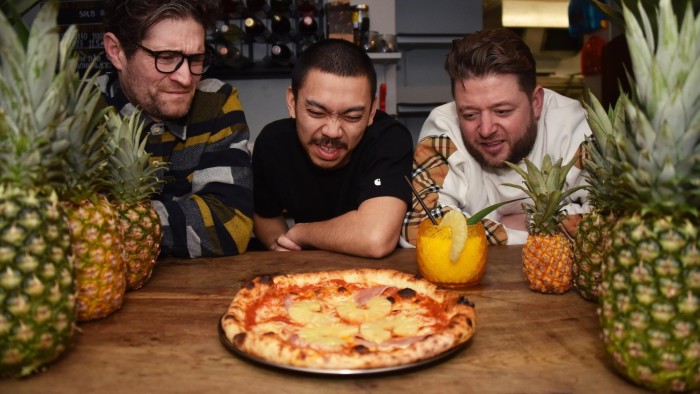Unlock the Editor’s Digest for free
Roula Khalaf, Editor of the FT, selects her favourite stories in this weekly newsletter.
When was the last time you looked at a marketing campaign and thought, “how quaint!”? It happened to me on Wednesday, as newsrooms around the world scrambled to respond to tidings of a Hawaiian pizza costing £100.
This was not a special pizza served in a diamond shark tank off the coast of Dubai. No gold-leafed pineapple to justify the spend. Put simply, a pizzeria in Norwich hated the idea of pineapple on pizza soooo much that they were making it prohibitively expensive to order one.
UK media companies ran the story along with a few dozen others around the world, including Fox News and a viral news site in the Indian state of Karnataka. Perhaps not the most conventional outreach list for a Norfolk pizzeria, but I doubt the owners cared. For this was a rare and wonderful thing: a promotional stunt that required nothing more than a willingness to say something playground-level controversial.
I suspect the story has prompted a scratching of heads among food PRs. Could that ever-elusive goal, “to get people talking”, really be achieved with the campaign equivalent of a cracker joke?
Most stunts have big money and exhaustive planning behind them. There are the brand-appropriate pop-ups, which in 2024 included a champagne bar from Gregg’s; an indoor “picnic pavilion” with a DJ from Sainsbury’s in the summer; and a bottomless pigs in blankets restaurant from Aldi in the run-up to Christmas.
Then there are the clever, costly anniversary stunts from big restaurants — like St John rolling back prices to 1994 to mark 25 years in business, a move that Rick Stein Restaurants is replicating next month for its 50th anniversary. In a bid to stand out, some new openings make an attention-grabbing gambit central to their identity. Peckham’s Café Britaly attracted headlines for serving carbonara with cream and a fried egg when it opened last spring . . . before announcing its closure this week.
The reason they go to all this trouble is because the most highly prized form of marketing for any entertainment brand is to get people to do something, whether that’s drinking champagne with a steak bake or eating grilled lobster for £2.80. And it doesn’t matter that the huge majority of customers won’t have the experience in person because they will get to consume it second hand through social media. So, while a prohibitively expensive pizza is a great headline for traditional media, it’s not so effective on TikTok because it’s unlikely to be “experienced”, filmed and uploaded by anyone.
Generating publicity via controversy also requires a restaurant or brand to judge what exactly customers will find fun and what they will find offensive. Pity (or don’t) the chef who decided to ban vegans for a laugh and then watched with horror as his restaurant’s Google rating fell off a cliff.
But if you are brave of heart and steadfast of spirit, there is clearly still a huge amount of good old-fashioned publicity to be found by stirring up debate — particularly by chastising customers for the things they like.
It works particularly well in the UK, where the news that we mustn’t order avocados at brunch (Firedog, 2017) or wear perfume to eat sushi (Sushi Kanesaka, 2023) encourages our etiquette obsession. The most talked-about London restaurant opening of the season, The Yellow Bittern, obtained this status through ritual humiliation of its customers for not drinking with lunch or ordering enough food.
Best of all, find a topic as perfectly banal as pineapple on pizza — a debate so inoffensive that it is second only to “Hey!” as the opening gambit on dating apps.
For the record: yum. And it’s cream before jam, whatever the Cornish might tell you.
harriet.fitchlittle@ft.com
Read the full article here

